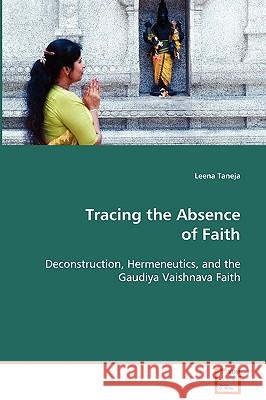Tracing the Absence » książka
Tracing the Absence
ISBN-13: 9783639082661 / Angielski / Miękka / 2008 / 348 str.
This dissertation seeks to draw the theistic tradition of Gaudiya Vaishnavism, a 16th century devotional Hindu sect, into dialogue with two Western theoretical approaches Deconstruction and Deconstruction. The issue of faith figures prominantly and a serves as the linchpin that connects these diverse discourses which are drawn from different cultural and historical contexts. While faith connects, it also challenges the boundaries and axioms of these individual fields of knowledge, offering a unique comparative examination of this contemporary topic. Using the rubric of postmodernity and the principles of identity and difference, this dissertation argues that the ancient theological doctrine of the Gaudiya faith, acintya-bhedabheda-tattva, meaning simultaneously oneness and difference, underscores how faith comes to be experienced not as an identity but as a difference from God. Faith as lack as understood by this medieval theistic school brings it closer to the postmodern view of faith articulated by Jacques Derrida."
This dissertation seeks to draw the theistic tradition of Gaudiya Vaishnavism, a 16th century devotional Hindu sect, into dialogue with two Western theoretical approaches—Deconstruction and Deconstruction. The issue of faith figures prominantly and a serves as the linchpin that connects these diverse discourses which are drawn from different cultural and historical contexts. While faith connects, it also challenges the boundaries and axioms of these individual fields of knowledge, offering a unique comparative examination of this contemporary topic. Using the rubric of postmodernity and the principles of identity and difference, this dissertation argues that the ancient theological doctrine of the Gaudiya faith, acintya-bhedabheda-tattva, meaning simultaneously oneness and difference, underscores how faith comes to be experienced not as an identity but as a difference from God. Faith as lack as understood by this medieval theistic school brings it closer to the postmodern view of faith articulated by Jacques Derrida.











